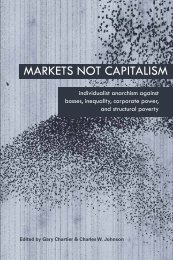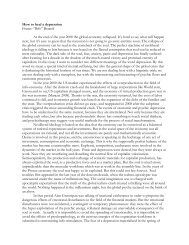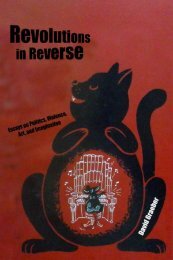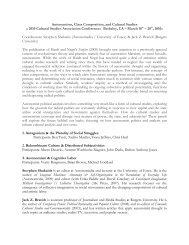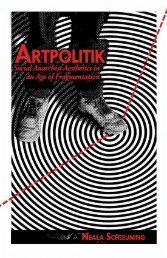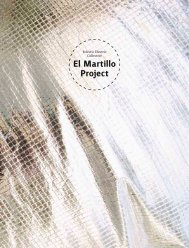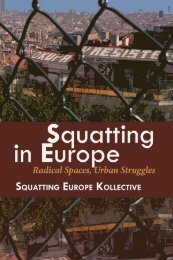nanopolitics handbook - Minor Compositions
nanopolitics handbook - Minor Compositions
nanopolitics handbook - Minor Compositions
You also want an ePaper? Increase the reach of your titles
YUMPU automatically turns print PDFs into web optimized ePapers that Google loves.
Some of us had arrived to Barcelona from other cities. To arrive to thisnew city and to project 3 and envision ourselves here in the future traversed us.Those of us who had already been living ‘en el extranjero’ – both ‘abroad’ and‘in the foreign’ - for some years, would constantly find ourselves facing theim-possibility of building liveable and shared lives, navigating through theconstant flows of friends and affections, all the time leaving and sometimesreturning, travelling and coming back, leaving apartments and searchingagain for a home and work, crossing the borders time and time again. Thesejourneys and passages, the fragility of what could pass and happen, whatmight pass through us, 4 of the project and projecting and envisioning ourfuture have been constants that traverse and question the esquizo group: howdo we inhabit the borders and passages? Anzaldúa, the mestiza, comes to usand whispers: what can be done about this ‘intimate terrorism’ that is life inthe borderlands? 5Some of us came from political spaces that had ceased to exist. This hadchallenged us with questions relating to our political practices. Questionsabout what we put in place during shared projects, beyond what we understoodrationally or ideologically as the horizon of the desirable. Others came fromsquatted or rented social centres where, embedded in precarity and the hustleand bustle of the city and its regulation of public space, our challenge was togenerate spaces for the production of social rights, autonomous education andterritories where to collectively think about our present. In these spaces, whichblurred the boundaries between the social centre as ‘our space’ (where we gotinvolved in activism, we learned, we worked and we enjoyed ourselves) andthe social centre as ‘public space’, where we experienced the neighbourhood,the city, pleasures and affections in which we wanted to generate archipelagosof community. These spaces of political practice had at times been organisedand shaped through activities where ‘the project’ had been the main formator apparatus around which we would assemble. Accompanying the wealthof these experiments, we simultaneously found ourselves exhausted in themidst of the dynamics of a city like Barcelona in which all aspects of lifewere constantly put to work. In which politics, reflection and knowledgeproductionprocesses, and even affective and leisure spaces, were constantlyoriented towards creating and producing under the transcendental formatof ‘a project’. We were urgently confronted with the question of production,specifically in the face of a bewilderment which, although we had not fullygrasped it yet, we sensed as a sort of imperative or inevitability. ‘The projects’traversed us, life itself was the great project to be produced and managed.This was our fertile territory: it was there that us, him, her and othersencountered each other. At what point did we begin to become a group? When41



